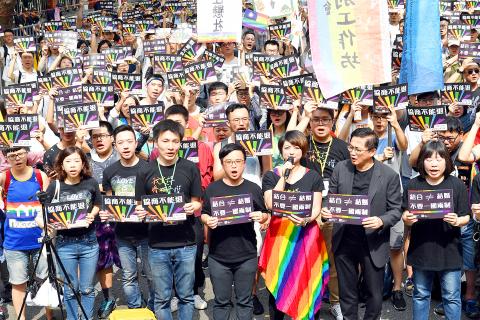About 1,500 supporters of same-sex marriage gathered outside the Legislative Yuan in Taipei yesterday, as lawmakers negotiated versions of a bill to fulfill the requirements of the Council of Grand Justices’ Interpretation No. 748.
The council on May 24, 2017, ruled that the Civil Code’s prohibition of same-sex marriage is unconstitutional and set a two-year deadline for the law to be amended to allow marriage between partners of the same sex.
The rally, which was organized by LGBT rights group Marriage Equality Coalition Taiwan, was held in support of the Executive Yuan’s version of the bill.

Photo: CNA
Pegatron Corp (和碩) chairman Tung Tzu-hsien (童子賢), actress Wen Chen-ling (溫貞菱) and director Yee Chih-yen (易智言) were among the celebrities at the rally.
The Executive Yuan’s bill is already a compromise for LGBT groups, who would not accept any other possibility, coalition chief coordinator Jennifer Lu (呂欣潔) said.
While the Cabinet’s bill is not perfect, as it does not guarantee “complete marriage equality,” it is a compromise that LGBT rights advocates are willing to make to end the dispute between those who support and oppose marriage equality, and out of respect for societal harmony, she said.
LGBT groups would not accept a bill that does not allow same-sex partners to register their marriage or become legal spouses, she said, adding that “unions” cannot replace marriage.
Meanwhile, the Coalition for the Happiness of Our Next Generation hosted a news conference in Taipei calling on lawmakers not to force the passage of a same-sex marriage bill, saying that doing so would be against the will of the people.
The Legislative Yuan is required to enact legislation based on the principle that the Civil Code defines marriage as between a man and a woman, the group said, adding that this “new legislative principle” was introduced with the passage last year of Referendum No. 10, which asked: “Do you agree that the Civil Code should define marriage as the union between a man and a woman?”
The group urged the Legislative Yuan to adopt the “draft enforcement act of Referendum No. 12,” one of the three proposed bills.
The version, which was introduced by Chinese Nationalist Party (KMT) Legislator Lai Shyh-bao (賴士葆), would guarantee the right of two people of the same sex to live together, it said.
Lawmakers failed to reach a consensus during negotiations, but agreed to remove an article in Democratic Progressive Party Legislator Lin Tai-hua’s (林岱樺) bill that would have given a same-sex couple’s relatives the right to request the annulment of their union.
The Marriage Equality Coalition Taiwan is to host another rally outside the Legislative Yuan on Friday as lawmakers vote on the bills.

NATIONAL SECURITY THREAT: An official said that Guan Guan’s comments had gone beyond the threshold of free speech, as she advocated for the destruction of the ROC China-born media influencer Guan Guan’s (關關) residency permit has been revoked for repeatedly posting pro-China content that threatens national security, the National Immigration Agency said yesterday. Guan Guan has said many controversial things in her videos posted to Douyin (抖音), including “the red flag will soon be painted all over Taiwan” and “Taiwan is an inseparable part of China,” while expressing hope for expedited “reunification.” The agency received multiple reports alleging that Guan Guan had advocated for armed reunification last year. After investigating, the agency last month issued a notice requiring her to appear and account for her actions. Guan Guan appeared as required,

Japan and the Philippines yesterday signed a defense pact that would allow the tax-free provision of ammunition, fuel, food and other necessities when their forces stage joint training to boost deterrence against China’s growing aggression in the region and to bolster their preparation for natural disasters. Japan has faced increasing political, trade and security tensions with China, which was angered by Japanese Prime Minister Sanae Takaichi’s remark that a Chinese attack on Taiwan would be a survival-threatening situation for Japan, triggering a military response. Japan and the Philippines have also had separate territorial conflicts with Beijing in the East and South China

A strong cold air mass is expected to arrive tonight, bringing a change in weather and a drop in temperature, the Central Weather Administration (CWA) said. The coldest time would be early on Thursday morning, with temperatures in some areas dipping as low as 8°C, it said. Daytime highs yesterday were 22°C to 24°C in northern and eastern Taiwan, and about 25°C to 28°C in the central and southern regions, it said. However, nighttime lows would dip to about 15°C to 16°C in central and northern Taiwan as well as the northeast, and 17°C to 19°C elsewhere, it said. Tropical Storm Nokaen, currently

PAPERS, PLEASE: The gang exploited the high value of the passports, selling them at inflated prices to Chinese buyers, who would treat them as ‘invisibility cloaks’ The Yilan District Court has handed four members of a syndicate prison terms ranging from one year and two months to two years and two months for their involvement in a scheme to purchase Taiwanese passports and resell them abroad at a massive markup. A Chinese human smuggling syndicate purchased Taiwanese passports through local criminal networks, exploiting the passports’ visa-free travel privileges to turn a profit of more than 20 times the original price, the court said. Such criminal organizations enable people to impersonate Taiwanese when entering and exiting Taiwan and other countries, undermining social order and the credibility of the nation’s